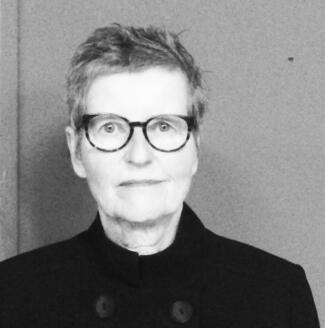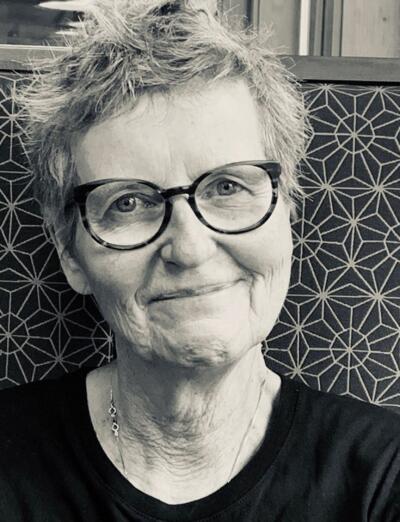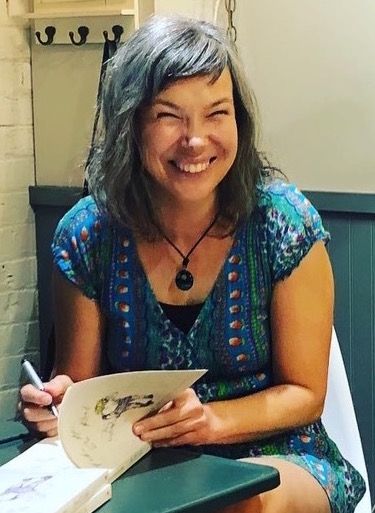1751 A feminist life examined
Sheila Norgate
If You Are Reading This: A/Mem.oir/ish/
Gabriola Island: Ladies Institute Press, 2022 (printed by Hignell)
$22.00 / 9780994761811
Reviewed by Susan Sanford Blades
*
 It should come as no surprise that a memoir written by a multi-media artist who pushed the boundaries of normal throughout her professional life does not follow the general conventions of memoir. Sheila Norgate’s memoir(ish), If You Are Reading This: a/mem.oir/ish/, is a series of mini-essays on a wide range of topics, such as antiquated etiquette books, bodily ailments (vomiting, rosacea, bad teeth, otoplasty, Crohn’s disease), fear of the outdoors, femicide, birthing practices, God, Santa, war brides, and vegetarianism. All are told from Norgate’s staunchly feminist perspective and most swirl around recurring themes of childhood trauma and the misogyny — both internalized and external — inherent to our society.
It should come as no surprise that a memoir written by a multi-media artist who pushed the boundaries of normal throughout her professional life does not follow the general conventions of memoir. Sheila Norgate’s memoir(ish), If You Are Reading This: a/mem.oir/ish/, is a series of mini-essays on a wide range of topics, such as antiquated etiquette books, bodily ailments (vomiting, rosacea, bad teeth, otoplasty, Crohn’s disease), fear of the outdoors, femicide, birthing practices, God, Santa, war brides, and vegetarianism. All are told from Norgate’s staunchly feminist perspective and most swirl around recurring themes of childhood trauma and the misogyny — both internalized and external — inherent to our society.
The essays are composed of a mixture of personal story and researched facts and insights on the topics of the stories. For instance, in “See How She (doesn’t) Run,” we learn about the fight, flight, or freeze instinct and that, for victims of abuse, freezing is the only viable option, since to run or to fight would ultimately induce more harm. In this essay, Norgate introduces us to the expression “freeze and appease,” in which some people (more often women) in dangerous situations will appease the perpetrator in order to avoid conflict and save themselves. In “If It Please The Court,” Norgate presents guilt and self-recrimination as a form of control and protection of the self from true accountability in relationships — if she pre-emptively takes the blame for the suffering of those close to her, she doesn’t need to acknowledge her own suffering. In “Melancholy Baby,” she combines the story of her birth in the backseat of a Buick and subsequent removal from her mother at the hospital — for the purposes of “decontamination” — for the first several days of her life, with a history of the medicalization (and, in her words, barbarism) of birthing practices in North America.

It’s clear the author has spent a lot of time analyzing both her internal and external worlds in order to understand herself. I found the background information truly interesting and really appreciated learning more about her situation in this way. She not only tells us that she has suffered childhood trauma, she lets us in on how exactly this trauma has affected her psychologically. She not only tells us that lesbian bed death is real, she explains to us that this may be because of all of the objectification and assault women and their bodies have suffered at the hands of men. But what also seemed clear to me is that she is using these facts and this knowledge as a sort of authorial defence mechanism in order to hide from the deeper elements of her experience. What’s missing here is emotional depth, the development of Sheila Norgate as the protagonist of her own story. Throughout the book, the author mentions in passing many dramatic incidents — a psychotic boyfriend, a potential drug overdose, a traumatic first lesbian experience with an older teacher, abuse of anti-depressants, a cross-country adventure — but does not give us anything further. It’s not that I wanted the salacious details, but I wanted the life surrounding the details. What brought her there? How did she feel; what were her conflicting emotions? In what ways were her abusers good to her and how did that confuse her, how did that make her question her own judgement? How has she behaved in intimate relationships? How have her friends and lovers reacted to her, and so forth.

I did love this book and what Sheila Norgate had to say. Her prose flows well and she includes some really powerful images, thoughts, and turns of phrase that made me stop, reread, and underline. For instance: “the burden of women’s collective mourning, the sheer accumulated volume of unlived female life becomes a yoke that all girl children shoulder in one manner or another.” Or, “the pages of [etiquette books] have wallpapered the luge run of gendered entrapment that women have been sucked into ever since we gained opposable thumbs.”
Norgate’s mother was a war bride, an immigrant to Canada during the Second World War who never really acculturated. Her unhappiness in her new country, with a husband who “swung wildly between dismissive indifference and explosive brutality,” and children she never bonded with, has seeped deeply into the author. Norgate’s lack of connection with her mother, the trauma of this primal wound, combined with her anger over the patriarchal society that abetted her mother’s unfair and miserable life, has affected every aspect of her own life and comes through in every word she writes. Her mother’s truly was an “unlived female life,” but Sheila Norgate overcame her difficult beginning to live a full life of her own. She’s been out as a lesbian since 1969 (before this was even legal in Canada), she practises her art on her own terms, and she has committed this smart and thoughtful life story to paper.
*

Susan Sanford Blades lives on the traditional territory of the lək̓ʷəŋən speaking people, the Xwsepsum/ Kosapsum and Songhees Nations (Victoria, Canada). Her debut novel, Fake It So Real (Nightwood Editions, 2020) won the 2021 ReLit Award in the novel category and was a finalist for the 2021 BC and Yukon Book Prizes’ Ethel Wilson Fiction Prize. Her short fiction has been anthologized in The Journey Prize Reader: The Best of Canada’s New Writers and has been published in literary magazines across Canada as well as in the United States and Ireland. Her fiction has most recently been published in Gulf Coast and The Malahat Review. Visit her website here.
*
The British Columbia Review
Editor and Publisher: Richard Mackie
Formerly The Ormsby Review, The British Columbia Review is an on-line book review and journal service for BC writers and readers. The Advisory Board consists of Jean Barman, Wade Davis, Robin Fisher, Barry Gough, Hugh Johnston, Kathy Mezei, Patricia Roy, Maria Tippett, and Graeme Wynn. Provincial Government Patron (since September 2018): Creative BC. Honorary Patron: Yosef Wosk. Scholarly Patron: SFU Graduate Liberal Studies.
“Only connect.” – E.M. Forster
4 comments on “1751 A feminist life examined”
I went to Norther Secondary High School in Toronto with Sheila from September 1965 until February 1967 when my family moved to Brantford, Ontario. We were best friends and I spent time with her and her family. Even then, as teenagers, Sheila confided stories of her family’s disfunction. We remained friends even after my family moved to London, Ontario and visited each other back and forth for quite some time. As it often happens with distance, we drifted apart. Many years later, when I was married and living in Creston, BC, we reconnected when I looked her up on my computer. I travelled to Calgary to see her art exhibition and sale. We enjoyed the weekend, caught up on the years and distance between us. I returned a gift to her she had given me when I moved from Toronto: her Grandfather’s pocket watch, onto which she had the letters AWWBUP engraved on the back cover of the watch. I think only Sheila and I know what the letters mean. Once again, we lost touch as our lives took us in different directions. I am so pleased and proud of my old friend. Sheila is one of a kind to be sure!
Sheila Norgate is indeed a bundle of ironies – a feminist who loves Santa Claus, a lesbian who dons a disguise as somebody’s husband – but she’s also a quiver of sharp sharp remarks that do their job: making us pay attention.
Excellent review. It’s a really interesting and enjoyable book.